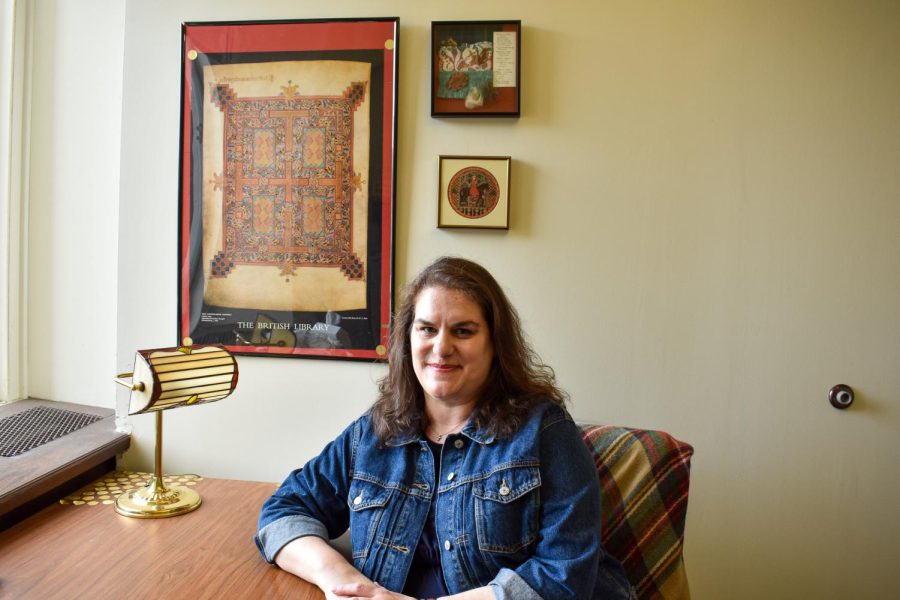Faculty reflect on more robust COVID-19 accommodations
Alyssa Carnevali | Staff Photographer
Pitt English professor Shannon Reed sits in her office.
September 21, 2022
Despite having several autoimmune diseases and concern about transmitting COVID-19 to her elderly mother, English professor Shannon Reed prefers her students attend class maskless, if comfortable.
“For me, the issue of being hearing impaired and the mask causing difficulties in communications has been at the forefront,” Reed said. “I feel that I’m a better teacher when I understand what my students are saying.”
As part of a memorandum of understanding between the Pitt Faculty Union and the University, faculty with COVID-19 related health concerns can request additional virus mitigation measures in their classroom. The agreement, announced on Aug. 10 by the union, resolved an unfair labor practice charge over Pitt’s alleged failure to consult faculty before lifting the mask mandate in March.
Previously, accommodations were limited to faculty with qualifying disabilities under the Americans with Disabilities Act. The new process, which exists separately from the ADA, covers a broader range of health concerns as well as medically at-risk household members.
Reed said the University’s recently updated COVID-19 accommodations policy is a valuable option for her colleagues, and if on-campus transmissions worsen, she would “definitely consider” using them.
With the new policy, faculty may submit requests to their supervisor with proposed accommodations, such as remote instruction and virtual office hours, and can appeal denied requests to the Office of the Provost.
The agreement also grants all faculty the right to hold office hours virtually during mask-optional periods without filing for accommodations.
A Pitt spokesperson declined to comment on the number of accommodation requests received, the available accommodation options or the criteria for granting requests, but said “we are pleased that the parties were able to work together to create this new review process for COVID-19 work adjustments.”
Pitt also declined to give the name of the employee speaking on behalf of the University.
Given that the accommodation process runs through the University, the union said they lack complete data on requests.
After offering virtual office hours last year, Bridget Keown, assistant professor in the gender, sexuality and women’s studies program, intended to return exclusively to meeting her students in-person. With the agreement in effect, Keown said she felt “much more comfortable” reintroducing a remote option, but remains wary of filing for further accommodations.
“As much as I believe that everyone should be able to get the accommodations they need, I also realize that if we all did what makes us feel safe then we would probably end up overwhelming the University with requests,” Keown said.
In the meantime, Keown wears a mask and asks students who feel unwell to attend class via Zoom.
Pitt’s current policy is to require indoor masking only when the Centers for Disease Control and Prevention classifies community spread as “high” in Allegheny County. Masks are optional if spread is medium or low — as of Sept. 19, the county is designated as medium.
Pitt’s COVID-19 Medical Response Office still recommends masks, even for fully vaccinated students. Masks are recommended “especially for individuals who are immunocompromised and those close to them, and in settings where you are in close contact with a number of people,” the CMRO said. “Masking plus staying up to date on vaccinations offers the best protection for everyone.”
Melinda Ciccocioppo, chair of the union’s Communication and Action Team, said faculty have embraced this strengthened ability to set virus mitigation measures in their classrooms.
“Implementing a new process always has its hiccups, but faculty have responded very positively to having access to an effective process for protecting their health and the health of their families,” Ciccocioppo said.
While Keown said she is appreciative of the new faculty accommodations, she’s never “fully trusting of bureaucracies” and worries the expanded request process still lacks inclusivity.
“Realizing that any norm that is put in place is not going to work for everyone is significant,” Keown said. “I think it is also worth celebrating the fact that our union negotiators have been able to get a greater level of accommodations for faculty.”








